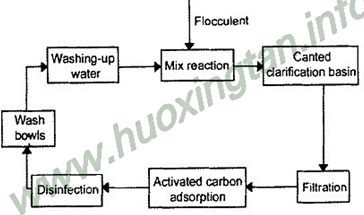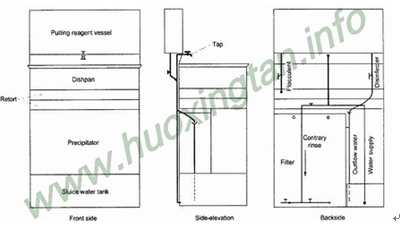Activated carbon is a graphite-like substance, which is a modification of microcrystalline carbon. The carbon atoms on the surface of the crystal are in different electronic energy states from the bulk carbon atoms, and the activated carbon and various substances have chemical and physical adsorption interactions with each other. As an important adsorbent, it is widely used in many fields such as chemical industry and environmental protection, such as industrial production for capturing organic solvents, removing gases, removing toxic substances, decolorizing solutions, sewage and circulating water purification. Activated carbon adsorption is an important factor in the field of environmental protection technology. Among them, the demand for activated carbon in the preparation of drinking water and natural water purification is increasing. With industrial development and urban population growth, fresh water is in short supply, and water resources development and utilization and water-saving projects are imminent. On the basis of summarizing the research on water treatment and purification technology at home and abroad, we designed a “purification water-saving device†suitable for street, food stalls and household dishwashing water, and carried out trial operation. It is designed to pass the water purifier treatment and disinfection to the drinking water standard, which can reuse the tableware water and prevent the spread of germs through the tableware.
2 experiment
2.1 Water sample
The tableware collected in the table is soaked in a 3.0L water basin. There are a lot of food residue particles in the water, the water is dirty and the oil content is large. Sampling analysis of the water quality of dishwashing water showed that the suspended solids (SS) reached 3000mg•L-1~4000mg•L-1, and the chemical oxygen demand (COD) reached 3000mg•L-1~5000mg•L-1; After the basin is washed with 3.0L of water, the SS of the water quality is reduced by 200mg•L-1, the turbidity is 90°~100°, and the COD is 500mg•L-1~650mg•L-1.
2.2 Purified water treatment process

Figure 1 Flow chart of purified water treatment
3 Results and discussion
3.1 Flocculation clarification
The dishwashing water is first clarified and decolored by flocculation in the mixing reaction tank to remove suspended matter and colloidal impurities. In this test, basic aluminum chloride [Aln(OH)mCl3n-m] was selected as a coagulant, and the dosage was 20mg•L-1~50mg•L-1 depending on the water quality.

Figure 2 Schematic diagram of the water purifier
Experiments have shown that the dosage is 30 mg•L-1, and the solution concentration is preferably 1% to 5%. In order to make the flocculant and wastewater mix and react sufficiently, a double-layer separator reaction cell was designed, and the average flow rate in the pool was 0.03 m•s-1. After 12 min of flow time, the fine particle size of the suspension formed a floc at the end of the reaction tank. After entering the sloping plate sedimentation tank, the flow rate suddenly slowed down, so that large particles were formed and sank into the bottom of the pool. The water is then filtered using an anthracite and quartz sand double inert filter to completely remove the suspended solids from the water still containing the smaller particulate impurities. When the filter material is saturated with impurities, it can be backwashed with gas and water. First, stir with air for 5min~10min, then backwash with water for 2min~4min.
3.2 Activated carbon adsorption
The dishwashing water is clarified by flocculation, filtered and then passed into the activated carbon (AMГA-5) adsorption column to remove some dissolved organic substances, pigments and certain trace metals (such as mercury, chromium, cadmium, lead, silver, etc.) and Coliform and so on. After a period of time, when the activated carbon is saturated, it can be regenerated by a vapor stripping method.
3.3 Disinfection treatment
The dishwashing water after flocculation clarification, filtration and activated carbon adsorption unit is treated by special disinfection. In the test, the chlorination disinfection method was adopted, and the sodium chlorate disinfectant was selected, and the available chlorine amount was 25 mg•L-1~30 mg•L-1.
3.4 Purification effect
According to GB5749-85, the dishwashing water after purification by the above process is tested. The specific data are as follows:
Chromaticity: colorless and transparent, no visible suspended matter, color <15°
Turbidity: 2°
Total dissolved solids: <1000mg/L
Total coliform: <3 / L
The results show that the street food stalls designed in this study and the household water-washing “purification water-saving device†can make the dishwashing water reuse, which not only achieves the purpose of saving water, but also prevents and reduces the spread of germs through tableware. way. According to the preliminary experimental results, after the continuous use of the "purification water-saving device" for 8 hours, it is required to discharge all the water in the equipment and clean the reactor and the sedimentation tank.
4 Conclusion
Through the dynamic test, the process flow of activated carbon treatment wastewater was determined, and a purification device suitable for household and food stalls and shop tableware washing wastewater treatment was designed. The initial use is good, providing a way for water reuse and disinfection. The "purification water-saving device" made must be further improved to promote the application.
Cheap Laminate Countertops,Black Laminate Countertop,Laminate Countertops Sale
Fenghua Jade Motor Co., Ltd. , http://www.china-interior-door.com